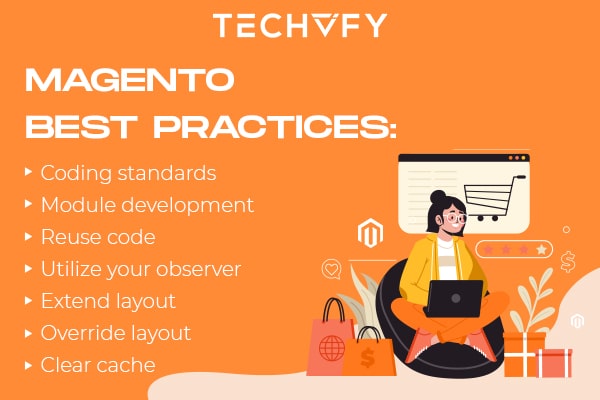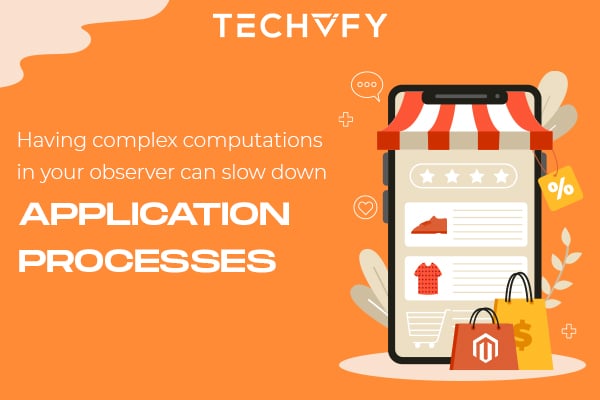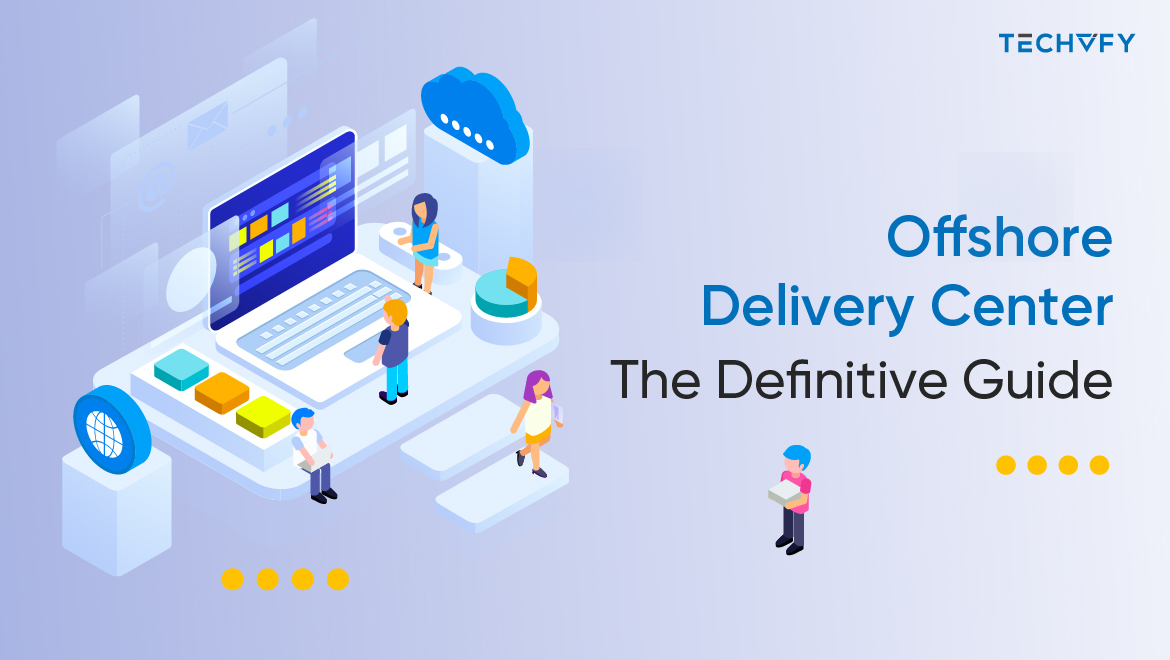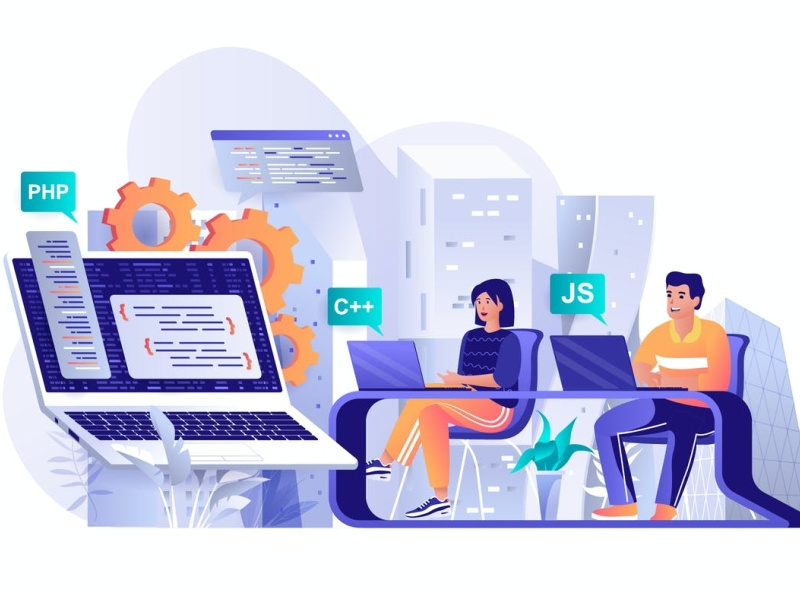Top 7 Magento Development Best Practices


Magento is a platform built on open-source technology and written in PHP, which helps developers create E-Commerce websites. Magento development is well-known for its flexibility in meeting various customers’ demands.
However, so many different pieces are involved, so it’s important to have a set of procedures in place to keep the codebase nice and tidy. Implementing a formal process, known as Magento development best practices, to standardize repeatable tasks helps ensure the reliability of your store, speed up the code preview process, and prevent unwieldy situations from occurring in the first place.

The first Magento development best practice is coding standards. Magento Coding Standard is the official coding standard built for and recommended by Magento. Make sure that your Magento coding standards are based on Zend coding standards, PSR1, PSR2, and PSR4. Following these standard conventions gives your code a professional look while making it tidier and easier to read.
Edit core files can break the default Magento application’s behavior and lead to many vulnerabilities, so guarantee that you always follow coding standards. Because your project or task requires a fast turnaround, all the developers usually lose focus on adhering to standards. By skipping the standards, you may get quick results, but your work will lack quality, and progress will stall quickly.
Another great reason to follow the Magento development best practices of Coding Standard is that by following these guidelines, your code has a much higher rate of quality and compatibility with the extended Magento ecosystem. Magento Coding Standard is used for automated reviews for Magento Marketplace modules. It also utilizes the compatibility with Magento instances running on the Magento Cloud.
Learn more:
Magento consists of the core code and optional components that can enhance or replace the core code. So, if you need to change the way that Magento development works, Magento’s architecture allows improvements by letting you develop your own components, like creating a module or a separate theme. By developing a new module, you can test your changes on different installations, disable the functionality if a problem arises, and reinstall the functionality when you upgrade your platform.
While developing any module, one of Magento’s development best practices is to ensure is that proper naming conventions are being followed and case. Maintaining consistency while naming conventions for files, folders, methods, and classes is a must in developing a new module from scratch. If you got lost in creating additional coding, then look at the Magento source code. Magento code is often a source of inspiration when you are approaching something new.
Reducing the redundant code is the most basic and most effective among Magento development best practices for increasing the performance of any code. Instead of using the same code in multiple places, create a single class or method, reference it when required, and make sure to reuse code as much as possible.
Another key consideration here is to write generic code in Magento development. The code you write should be small, focused, and should provide a generic solution. This will let you re-use these pieces again in future development.
Observers are dynamically injected into the execution flow, making it capable of modifying the behavior of a Magento application. Poorly designed and coded observers can cause issues, instabilities, or otherwise break the application.

Try to keep your observer small and efficient by avoiding complex computations as much as possible. The following tips can ensure that the observer in your Magento application will run seamlessly:
Instead of duplicating extensive page layouts or configuration codes and then modifying what you want to change, Magento development’s best practice is creating an extending layout file containing the changes you want.
If the number of customizations is large, you cannot customize the layout by extending the existing ones. In this case, Magento development’s best practice is to use the overriding function for the needed layout file. This means that the new file that you place in the theme will be used instead of the parent theme layout file of the base layout file.
Forgetting to clear or disable caching can be very troublesome to your Magento development process. It is recommended to clear your cache before doing visual checks for your theme to make sure the content displayed is correct.
While you’re developing Magento components (modules, themes, and language packages), your rapidly changing environment requires you to clear certain directories and caches periodically. Otherwise, your code runs with exceptions and won’t function properly.

In conclusion, those are Magento development best practices that should be followed to ensure optimized code for your Magento E-Commerce website. If you have a project in mind or some additional questions about Magento extension or Magento development, leave your contact below, and we will contact you shortly with appropriate technology solutions for your business. TECHVIFY is fully qualified in consulting and offering you the best Magento development service.


Table of Contents#1: Coding Standards #2: Module Development #3: Reuse Code #4: Utilize Your Observer #5: Extend Layout #6: Override Layout #7: Clear Cache Conclusion Medical billing software simplifies the healthcare billing process for doctors and medical offices by automating it. Finding suitable software can enhance your office’s reimbursement rates, optimize revenues, and support a sustainable medical practice. Assess your office’s needs to choose the best medical billing software. Look for software that manages appointment scheduling, automatically enters patient data during consultations, and includes scrubbing features to boost insurance company acceptance rates. The top programs provide comprehensive practice health reports and analytics. TECHVIFY has reviewed the leading…
07 May, 2024

Table of Contents#1: Coding Standards #2: Module Development #3: Reuse Code #4: Utilize Your Observer #5: Extend Layout #6: Override Layout #7: Clear Cache Conclusion The practice of offshoring has become increasingly prevalent among businesses seeking competitive advantage in a global marketplace. This trend extends beyond large corporations to encompass businesses of all sizes, including startups and SMEs. By shifting focus away from in-house IT departments to offshore delivery centers (ODCs), companies can leverage lower labor costs and access a diverse pool of skilled professionals, enhancing their operational efficiencies and focusing more on core business strategies. As companies increasingly outsource their entire IT operations, the benefits of…
07 May, 2024

Table of Contents#1: Coding Standards #2: Module Development #3: Reuse Code #4: Utilize Your Observer #5: Extend Layout #6: Override Layout #7: Clear Cache Conclusion Information technology reshapes every industry, including finance, where banking software is introduced. Innovations like IoT in supply chains, AI in software testing, and big data in retail have enhanced efficiency and customer experience. Financial technology, utilizing tools like mobile apps, machine learning, and blockchain, offers solutions that surpass traditional methods in accessibility and cost-effectiveness. The finance sector is competitive, with few standout solutions. Historically, C++ and Java were preferred for banking app development, but their relevance may be diminishing due to rapid…
06 May, 2024


Thank you for your interest in TECHVIFY Software.
Speed-up your projects with high skilled software engineers and developers.
By clicking the Submit button, I confirm that I have read and agree to our Privacy Policy